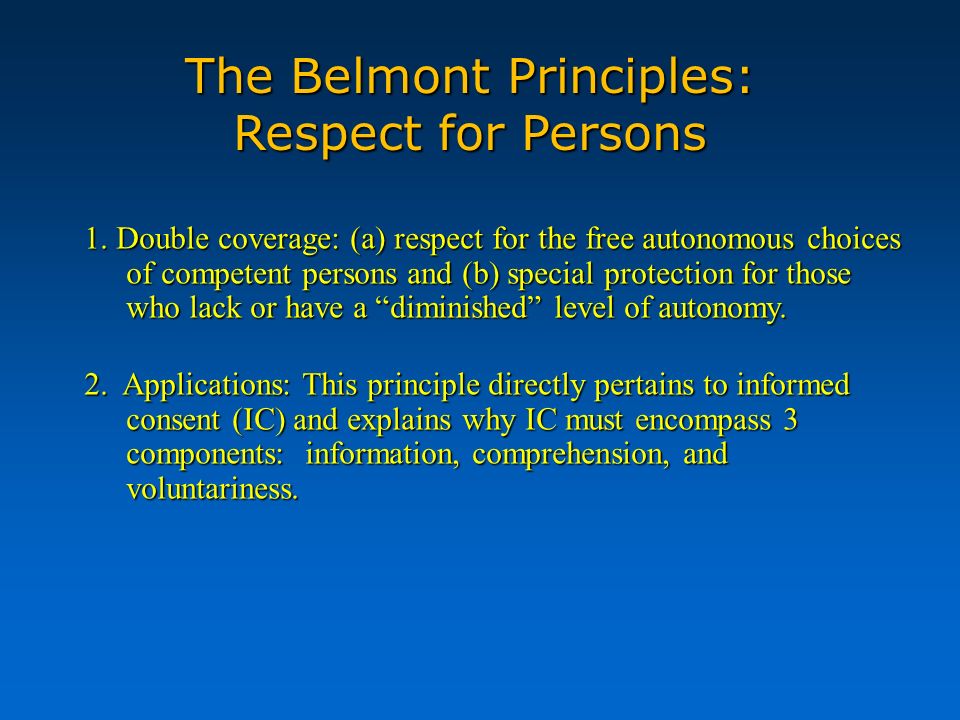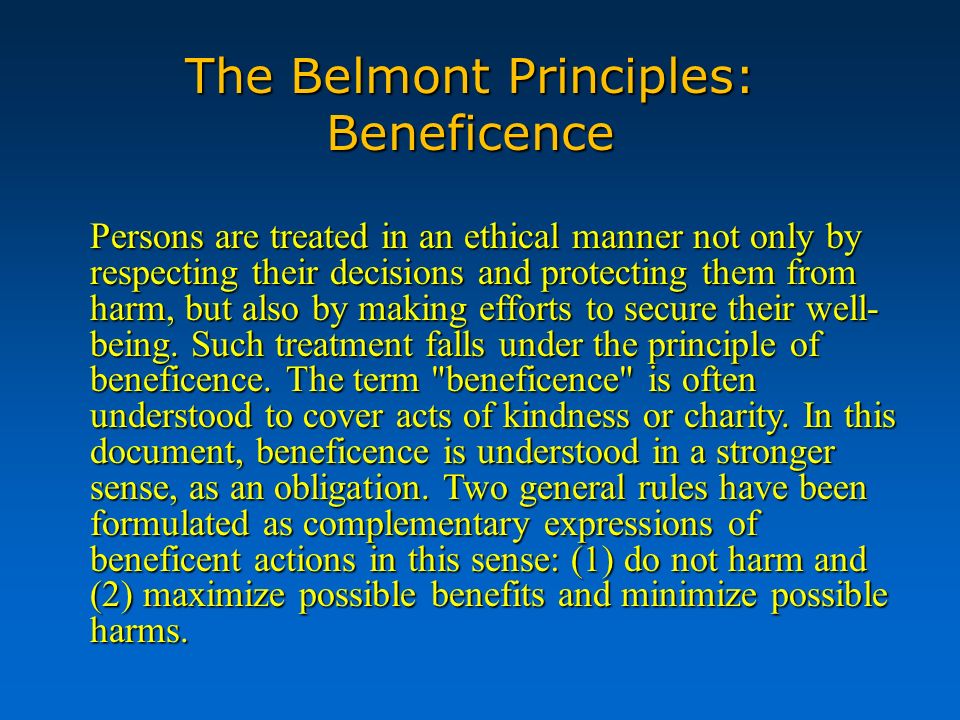The principle of Beneficence requires that potential benefits to the subjects are maximized and potential risks of harm are minimized. Risks to subjects are reasonable in relation to anticipated benefits.

The Belmont Principles Of Respect For Persons Beneficence And Justice Ppt Video Online Download
Which of the following studies is linked most directly to the establishment of the National Research Act in 1974 and ultimately to the Belmont Report and federal regulations for human subject protection.

. Which President created the forest service. This is an ethical principle and is one of the three core Belmont principles. The Belmont Principle of beneficence requires that the investigator.
Potential benefits justify the risks of harm. 5-12-1865 Flat No. 1 do no harm 2 maximize possible benefits and 3 minimize possible harms when conducting research with human subjects.
Risks are managed so that they are no more than minimal. Subjects derive individual benefit from study participation. One of the ethical principles of the Belmont Report is that beneficial and harmful aspects of a study must be fairly and equally distributed across people.
Beneficence - the quality or state of being beneficent. The study makes a significant contribution to generalizable knowledge. The term beneficence is often understood to cover acts of kindness or charity that go beyond strict obligation.
Question 1 The Belmont principle of beneficence requires that. Statistics and Probability questions and answers. The benefits and burdens of participating in research should be distributed fairly.
Kind caring humane good hearted sympathetic and tender. Benefits to the subjects or from knowledge to be gained should outweigh the risks. The Belmont principle of beneficence requires that.
Justice means that subjects are selected fairly and that the risks and benefits are distributed equitably among subjects. The principle of beneficence. The Belmont Principle of beneficence requires that Potential benefits justify the risks of harm.
Subjects derive individual benefit from study participation. The principle of Beneficence requires that potential bene fits to the subjects are maximized and potential risks of harm are minimized. A subject in a clinical research trial experiences a serious unanticipated adverse drug experience.
The Belmont Report states Protect yourself from the risk of subject safety and be aware of the loss of benefits gained from the study. 203 Moula Ali Hyderabad - 500040. Justice means that subjects are selected fairly and that the risks and benefits are distributed equitably among subjects.
The preview shows page 1 - 2 out of 2 pages. Question 2 The Belmont principle of beneficence requires that. The belmont principle of beneficence requires that.
1 do not harm and. Two general rules have been formulated as complementary expressions of beneficent actions in this sense. Asked May 2 2017 in Criminal Justice by AxeViro.
Ensuring the well-being of a subject in research is a matter of goodwill. An example of how the Principle of Beneficence can be applied to a study employing human subjects is determining that the study. Potential benefits justify the risks of harm.
In this document beneficence is understood in a stronger sense as an obligation. Risks to subjects are reasonable in. Owen joyner little sister.
The principle of beneficence requires us to both protect the participant against risk of harm. As defined by the Belmont Report the principle of beneficence obligates the researcher to adhere to two basic guidelines. The Belmont Principle of beneficence requires below.
Risks are managed so that they are no more than minimal. Ethical Principles and Guidelines for the Human Subjects of Research. Eli Pariser wrote the Filter Bubble which discusses the.
The study makes a significant contribution to generalizable knowledge. The Belmont principle of beneficence has the requirement that the subjects used for research are protected from the risk of harm and also people should be worried about the loss of important benefits that can be gotten from research. The Belmont principle of beneficence requires that.
Benefits to the subjects or from knowledge to be gained should outweigh the risks. Potential benefits justify the risks of harm.

The Belmont Principles Of Respect For Persons Beneficence And Justice Ppt Video Online Download

Solved Question 2 The Belmont Principle Of Beneficence Chegg Com

Solved According To The Belmont Report The Requirement That Chegg Com
0 Comments